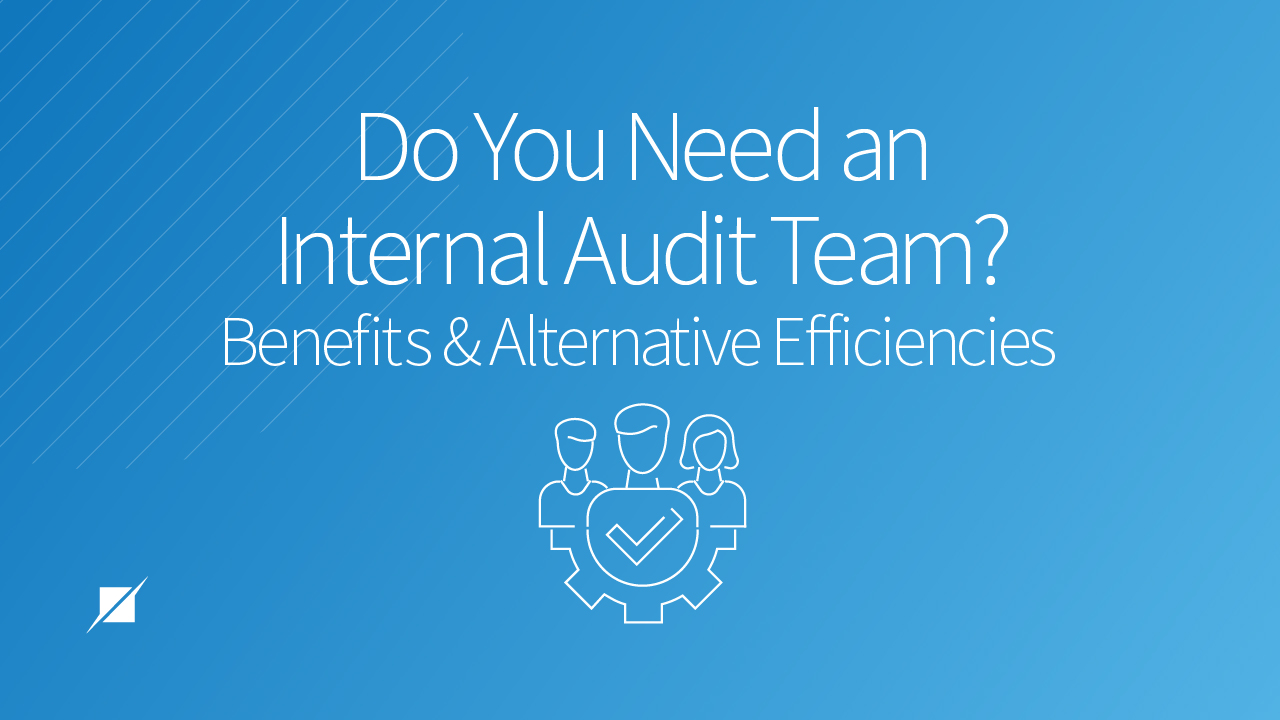Do You Need a Team Of Internal Auditors?
Compliance and Certification | Audit Readiness
Published: Feb 21, 2023
Last Updated: Jan 19, 2024
Auditors. We’re an odd breed. “A necessary pain in the tuchus,” some may say. Admittedly, we’re not everyone’s cup of tea. In fact, in our 20+ years of experience, we’ve seen the word “auditor” invite various visceral responses. To be sure, organizations aren’t always enthusiastic about inviting us assessors in to do the requisite checks, despite the benefits of doing so (and despite being invited guests).
However, what you might not know is how advantageous it can be to form an internal audit team that supports these initiatives year-round.
After all, there can be benefits to facing the increasing challenges of data security head-on, with tenacity and persistence. So that’s why, as an independent, external assessor, we’d like to explain why devoting an internal team to this work year-round can elevate your audit efficiency and efficacy and actually increase your return on assessment investment (what we’re calling ROAI).
Let’s face it, the thought of a third-party assessor barging through your lobby, poring through your company documents, interviewing already overworked control owners, and issuing a report that includes results of failed controls can rattle even the most prepared of teams. But it doesn’t have to be that way. And an internal audit team can help.
2 Big Benefits of an Internal Audit Team
It might be a stretch to imagine a stress-free audit, but the idea gets a whole lot more realistic if you have an internal audit team—personnel that is present all year long with the primary responsibility to verify that controls are operating effectively.
Here are two ways an internal audit team can massively support further efficiency of your external assessment.
1. Continuous Auditing
In our experience, the internal audit teams that are the most successful are those that leverage the continuous audit approach, which is the practice of performing auditing activities on a more frequent basis.
Your external assessors are only coming in once or only a few times a year, but your internal team is in place all year round, so they’re well-positioned to perfect such an approach to auditing. Far too often, the findings noted within SOC reports could have been—and frankly should have been—noted and resolved before the external auditors arrive on site, including oversight, which is the most common cause of control exceptions.
But if you train a devoted team and encourage them to frequently visit and revisit controls periodically to ensure they are operating effectively, you’ll better position yourself for a successful audit experience.
That’s because an internal team will be able to help resolve any problems at the time of their discovery before the external team even arrives on site, and this control monitoring can strengthen your overall control environment.
Therefore, there is a serious advantage in a strong internal audit team that ensures the foundation of your control infrastructure is operating effectively—more reassurance year-round while you eagerly anticipate your external audit team’s confirmation.
2. Knowledgeable Resource
And if your team truly does engage in continuous auditing, they’ll become a wealth of knowledge regarding your controls, which can be a big boon to a seamless assessment.
In their work prepping for upcoming external examinations, this team should be continually following up with organizational control owners to ensure the controls being reviewed are functioning effectively without error—that’s what you want, not just for your audit’s sake, but for your security too.
Audit-wise, any internal team members are great resources to have present during an assessment due to their frequent interaction with your staff and their deep understanding of the control infrastructure. Such knowledge makes them great liaisons because of their ability to organize meetings with true control owners. Now, when we say, “true control owners,” we mean that your internal audit members will know precisely who these folks are, as it’s likely they’ve probably followed up with the “wrong control owners” at some point previously while performing their day-to-day responsibilities.
And, if they’ve been using the recommended continuous audit approach, that likely means they’ve racked up a lot of face-to-face time with these key control owners and have probably established a decent working relationship with them over time. So, not only will your internal audit team have amassed much better insight into what’s occurring every day than that of your external audit team, but they’ll also probably understand how best to handle any personalities or circumstances that require special handling.
Moreover, they’ll understand the various workloads for different team members and so can assist in delegating information request items to other personnel, if necessary, which is a huge help to both your other internal staff and the external assessors who need to meet and obtain evidence from your people.
Having an internal audit team ready to distribute responsibilities and reduce the potential bottleneck of evidence is a huge advantage. One of the biggest critiques audits and auditors receive is regarding their disruption of normal operations, but by using internal auditors as a liaison, you can largely reduce the disruption during the external review. With their knowledge and ability, someone on your internal team can serve as the point person to both efficiently organize the necessary meetings and navigate any challenges.
We understand—nobody wants external assessors wandering through halls, or pinging people incessantly looking for control owners. But if you have an expert internal team prepared and available to help them, you’ll also help you.
Creating Audit Efficiency Through a Single Provider
Compliance assessments aren’t cheap, even though they are necessary in many cases. So it makes sense to try and maximize your return on that investment (ROAI) by keeping an internal audit team on staff. As we’ve just explained, these folks can help facilitate a more successful and seamless assessment when your independent third party comes in.
We wrote this article because we’re the external auditors that have benefited directly from our collaboration with them; however, we understand that fielding such a group can also be considered a bit of an impossible luxury.
Maybe you’re a smaller organization where everyone already wears multiple hats, maybe your assessment budget is maximized due to multiple endeavors, or maybe you’ve recently had to lay off what was your internal audit team due to necessary organizational cutbacks.
Despite any recent negative impact on your (potential) internal audit team—layoffs or otherwise—you aren’t necessarily completely out of luck when it comes to audit efficiencies—if you can’t look inward to bolster audit support, you should instead reevaluate your external partner.
Oftentimes, organizations will choose an assessor for a specific compliance project to start, but as your business grows or evolves, your needs might change. More assessments could mean more assessors, but it doesn’t have to, as you can also choose to work with a single-provider cybersecurity firm like Schellman.
Firms like ours feature a greater breadth and depth of expertise across multiple and different frameworks and control sets that you may or may not need to comply with. You may not be able to swing mobilizing an internal audit team, but switching to a single service provider and consolidating your projects under one roof can also create assessment efficiencies, albeit different ones—and these may include pricing reductions, depending on the services bundled and timelines.
We’ve heard directly from our clients that such strategic alignment has benefited them immensely—to get more of a sense of the benefits, you can read all about Lumen’s experience and how partnering with Schellman for their multiple and diverse compliance needs streamlined their experience for their small internal team.
Moving Forward with Your Compliance Initiatives
While it’s impossible to ensure a perfect audit, retaining a strong and resourceful internal audit team that continuously evaluates your environment and maintains familiarity with your control infrastructure absolutely can lead to a better assessment experience. Their periodic review of in-scope controls and their increased familiarity with relevant staff means that these personnel essentially prep you for your external assessment throughout the year.
But such an invaluable resource isn’t a luxury available to every organization and their particular circumstances, but there are still other ways to create greater audit efficiencies, the biggest of which is engaging the right single-service provider for your compliance needs.
If you’re interested in learning more about Schellman’s capabilities and whether our approach to your service needs is right for you, we’d love to hear from you and address any concerns you have about a potential switch or whether our methodology and expertise could improve your audit experience.
About Jordan Hicks
Jordan Hicks is the Manager of Content at Schellman. As the owner of content marketing initiatives across all digital platforms and formats, she is responsible for the ideation of content, the authoring and development of the content, as well as developing and managing the editorial calendar to ensure the marketing goals are met as it relates to content.




